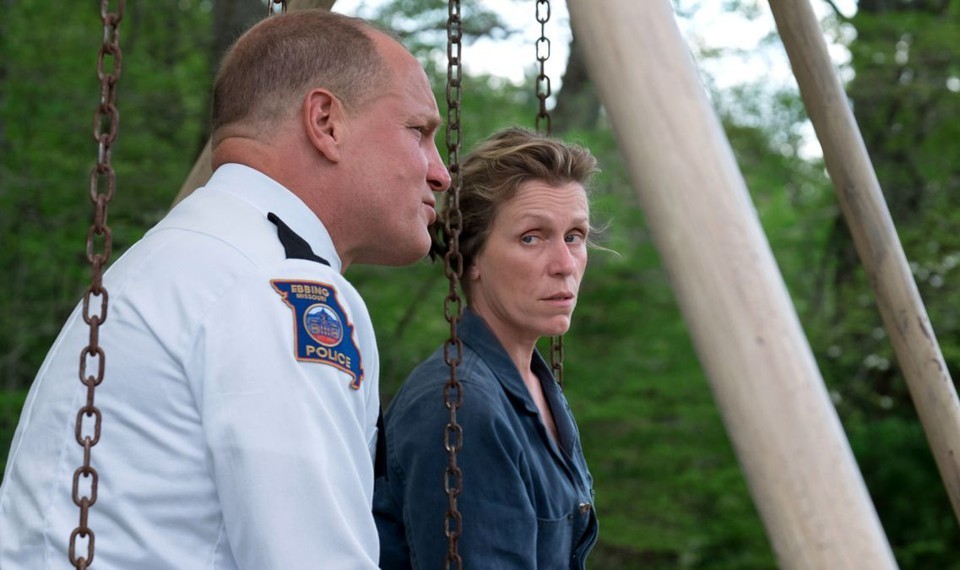Martin Mcdonagh encapsulates all the darkest parts of reality that your parents kept secret when you were young. This makes this film a tough pill to swallow.
The sickening depths of human grief and despair are explored throughout, but Mcdonagh never makes it seem ironic or forced. A skill typical of his earlier work such as seven psychopaths. However, as in that film, there is a lot of humour here. A unique dark humour that is present despite all your best intentions telling you it’s wrong. You’ll find yourself checking the room immediately after a joke to see if anyone has caught you laughing.
The heroine Mildred Hayes (Frances McDormand) puts in a performance on par with Fargo. Making it clear why Mcdonagh wrote the film with her as the lead role in mind. She plays a woman who is trailed and weighed down by the grief of losing her daughter in a horrific rape-murder. The seeds of impending disaster are sown when she rents three controversial billboards on the outskirts of the fictional Ebbing town. They send a message to the beloved police chief Willoughby (Woody Harrelson) as the case of her daughter’s death continues to bear no fruit. This reminded me of the quote: “Beware that, when fighting monsters, you yourself do not become a monster… for when you gaze long into the abyss. The abyss gazes also into you.”
Carter Burwell’s opening score “Mildred goes to war” sets a spritely beginning as she wavers the purchase of the three billboards from a naturally charismatic marketer Caleb Landry Jones. The score resonates with the spaghetti western setting of the south of the US, whilst framing Mildred’s cast iron grit and rigour.
McDormand’s expressions are subtle and deep. They express a history of torment starting with her marriage with brutish ex-husband (John Hawkes) who is now fitted with new 19 year – old partner (Samara Weaving). McDormand’s Mildred has finally toppled over the edge and becomes completely obsessed in a path of revenge encapsulated through justice for her daughter, yet with the morality of her undeterred pursuit of justice increasingly being called into question, a deeper explanation for her drive is left for the viewer to muse on.
Mcdonagh makes sure the audience’s perception of hero and villain, right and wrong and what is acceptable in the face of the greater good is tested and self – analysed throughout the film. Especially when Mildred meets Woody Harrelson’s assertive yet soft family man Chief Willoughby. Mcdonagh writes their meeting with an exquisite balance of cold grief and tender frustration in a symphony of melancholic disparity which is underscored by Burwell’s poignant orchestral sound. As the film progresses each character reveals a new layer, a new complex or insecurity which can sometimes completely flip the projection of the film.
Every character in this film expresses a reflection of suffering in the human condition and its plurality. Ignited by the erection of the three billboards each personality’s undulating journey unfolds. No less the oafish, openly racist deputy Dixon (Sam Rockwell) who’s unchecked violence and provocation tests the goodwill of any character he meets. Yet not every character’s personality refracts from Mildred’s action, such as a used cars salesman Peter Dinklage who plays an important role in Mildred’s future.
In the end, Mcdonagh’s town is not one of the heroes, it is a town of unbridled humanity in circumstances both extreme yet hauntingly relatable throughout.
By Harvey Clitheroe

